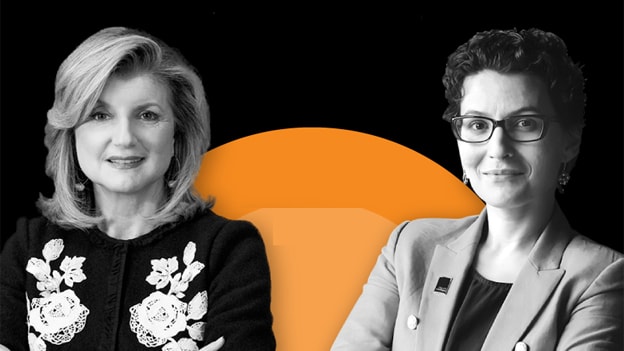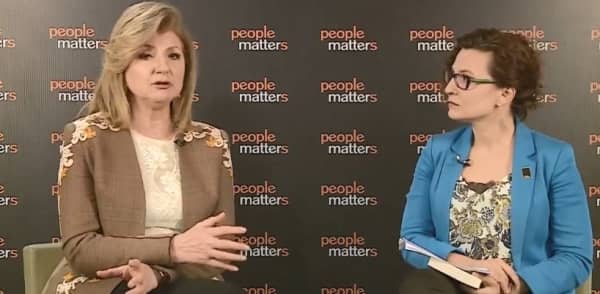Give up the delusion that burnout is the inevitable cost of success: Arianna Huffington

Burnout, sleep deprivation and exhaustion-ironically, these are what served as a wakeup call to Arianna Huffington, well-known media personality and Founder, Huffington Post to redefine what success meant to her. That wakeup call made her give up the delusion that a burnout is a price we pay for being successful and started her off on a journey to make others also give up that ill-founded belief.
This is what led to her next global venture Thrive Global, with which Arianna aims to end the stress and burnout epidemic by offering companies and individuals sustainable, science-based solutions to enhance well-being. With Thrive Global, she wishes to help people create a healthier relationship with technology and prioritize their well-being and is committed to accelerating the culture shift that allows people to reclaim their lives.
In an exclusive Facebook Live session with Ester Martinez, CEO & Editor-In-Chief, People Matters, Arianna shed light on what does it take to ensure wellness in the age of the digital crisis and how we urgently need to re-calibrate our relationship with technology.

Tell us a little about your journey, what prompted you to start Thrive Global? What are the major milestones of this journey in making wellness something which is not only driving individual performance but also helping organizations find a new way of redefining performance?
What prompted me was a painful wakeup call as very often is the case. I collapsed from burnout, sleep deprivation, and exhaustion in 2007, two years into building the Huffington Post and being a divorced mother of two teenage daughters at the time. That is what started me into studying the latest science and understanding the delusion that we all are living under that in order to succeed, we have to burn out.
So I started covering these issues at The Huffington Post, I wrote two books about it- Thrive and The Sleep Revolution. Two years ago I decided that was not enough, that I actually wanted to devote a 100% of my life to helping individuals and organizations take small steps, what we call micro steps at Thrive, to change behavior and see the outcomes-both in terms of performance and health & happiness.
Tell us something about the shocking data that helped you build a business case for wellness.
Let us look at the data in India- over 80% of people say they are stressed. And over 60% of people in their 20s are suffering from some form of illness such as depression or anxiety. So what’s happening now is that the cumulative stress in people’s lives compounded by our addiction to phones, technology, social media, and games had made it easier people to see that this is not sustainable. Something has to change.
What we are doing at Thrive is work with companies to help them change their culture and see the impact on the bottom line.
Along with that, we have a media platform that brings together the latest science, new role models of successful people who are actually bringing these small changes in their lives and seeing the impact on their productivity.
Can you share some examples of how shifting beliefs drives the shift in behaviors?
Well, let me start with my favorite micro-step. It is based on the assumption that nobody who has an interest in any kind of job can say at the end of the day that I have done absolutely what I could have done. So people need to declare kind of an end to their day-an arbitrary end to their day. The micro-step is to declare that end to your day, stop dealing with work and start working on recharging-which is work if people don’t prioritize it!
So the way to declare the end of the day is to turn off your phone and charge it outside your bedroom.
This seemingly is a very easy step but it is very hard for a lot of people who are used to sleeping with their phones. And they think that is the way to be super productive. It is not because everybody needs a little time to really recharge fully and return to the next day resilient and creative. So even resting is part of your work. Because if you wake up exhausted in the morning, it is going to affect the quality of your work.
Tell us some examples that you have seen especially in the world of sports and how sports can teach us that to really reach big performance, you do need to take care of the self?
My favorite example is that of Andre Iguodala who is a very successful part of the San Francisco Golden State Warriors and an investor in Thrive. He has tracked very analytically his connection with his performance on the court and how much time he has taken to sleep, eat right, or meditate-whatever was his program. You can see the direct connection to the stats.
We talked about the individual barrier to turn off. The second barrier is the corporate barrier. While organizations have understood the importance of wellness, there is still resistance to really invest in wellness. What’s your message for corporates?
Well, I think the message is that they should see investing in human capital as critical to their business metrics and bottom lines. It is not just a warm and fuzzy HR benefit. It is hardcore and incredibly important for performance. And that I think is the only way for people to change beliefs about producing the most effective and productive workplace.
How do you integrate that with the pressures of work delivery, clients? Is there any creative way of integrating micro-moments of wellness at work? How do you make these micro-moments sustainable?
I love that you call them micro-moments because they are micro-moments. Let’s say you have finished a very stressful meeting, take a minute, one minute to focus on your breathing, to deeply inhale and exhale, to remember three things you are deeply grateful for, or to stand up and stretch.
Whatever it is, you need what they call a 'pattern interrupt' otherwise the cycle of stress gets worse and worse. By the time you get home, you are too tired to sleep, and a lot of people self-medicate with drugs or alcohol. So there is a really deep connection with the accumulated stress of the day.
That’s where our media platform comes in-to make these micro-moments sustainable. Everything we do has a sustainability part otherwise you don’t have the long-term results. We produce compelling, personalized and engaging content that brings in the latest science and new role models which gives people the inspiration and permission to go against the culture of stress. That is how we are changing the belief that burnout is the inevitable cost of success.
Tell us about the play with technology-what is the opportunity technology brings to help us lead a better life?
Technology is neutral-it’s how we use it. There is now a whole movement called Tech for good. With mediation apps, apps to track your sleep, your steps, there is a whole wellness driven technology part in play. But the worst part of a lot of the apps is that people are consumed with their addictive nature.
Especially with social media, you see people getting addicted to validation or the number of likes. That ultimately is a very dangerous way to live.
How do you measure your success with this movement, with which you are making a difference to so many people? Where is that journey taking you?
For us, we are a very much global company. Launching in India was important to us. The goal for us is to reach millions of consumers through our media platform and work with hundreds of companies around the word on the specific human capital.
What is your final advice to our viewers on one thing to start and stop today?
I would say absolutely turn off your phone at the end of the day and charge it outside your room!
You can watch the session here.













